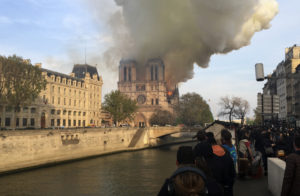
Yesterday, the world paused as the great Notre Dame burned. And as I watched, and tried to make sense of it all, I couldn’t help wonder about the old English poets, and how they tried to tell us about statues and buildings and man-made structures.
Yes, there needs to be science to prove theories and there needs to be math to prove validation and there needs to be engineering to prove feasibility of structure. I get all that. But what about poetry and art? There’s nothing that has to be proven or explained. There’s nothing that has to be discussed or accepted. You either like it, or you don’t. When I look at a piece of art I can tell you within 5 seconds whether I like it or not. And when I read a poem I can let you know if it moves me or makes me think or makes me feel emotional (or feel anything at all) within seconds. There is nothing scientific or mathematical about feelings. You either have ’em, or you don’t.
The horrifying fire at Notre Dame made me think of such things. We all watched in sadness as the building burned. The flames and smoke literally made me sick. And so incredibly sad. But it also made me think. I mean, a building can burn down and all can be lost in seconds or minutes or hours. But way back in 1620 Shakespeare wrote a little ‘ol sonnet that said, in part, that writing poetry about someone or something will make them live forever. Words, but most especially poetry, were eternal. Statues can crumble, buildings can burn, flowers will wither and die. But poetry, is eternal.

